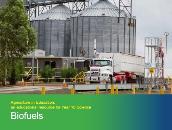 Biofuels
Biofuels
TLF ID M020825
This is a unit of work about ethanol and other biofuels. The unit revises students understanding of the carbon cycle and renewable and non-renewable fuel sources. The inquiry focuses on a series of experiments that examine the effect of temperature on the fermentation of yeast and to determine the flash point of ethanol before introducing a case study of the chemical processes involved in producing ethanol at the Dalby Bio-Refinery in Queensland. The final activity is a research task comparing various fossil and bio-fuels. The unit also provides background information, experiment preparation notes, pedagogical advice and a list of online resources for teachers and detailed assignment sheets for students. The unit is accompanied by the video 'Biofuels - From Sorghum to Ethanol'.
